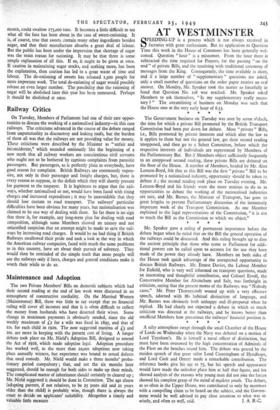Railway Critics
On Tuesday, Members of Parliament had one of their rare oppor- tunities to discuss the working of a nationalised industry—in this case railways. The criticisms advanced in the course of the debate ranged from unpunctuality to discourtesy and leaking roofs, but the burden of them all was that the railways are not providing value for money. These criticisms were described by the Minister as " unfair and inconsiderate," which sounded ominously like the beginning of a new myth that all railway workers are conscientious civil servants who ought not to be bothered by captious complaints from parasitic passengers. But passengers, as is perfectly plain to everybody, have good reason fcr complaint. British Railways are enormously expen- sive, not only in their passenger and freight charges, but, there is every reason to suppose, in the deficit which they will shortly present for payment to the taxpayer. It is legitimate to argue that the rail- ways, whether nationalised or not, would have been faced with rising charges and increased expenditure ; it may be unavoidable that they should lose custom to road transport. The railways' particular difficulties have been obvious for many years, but nationalisation was claimed to be one way of dealing with them. So far there is no sign that there is, for example, any long-term plan for dealing with road competition, although some Members showed an uneasy and not unjustified suspicion that an attempt might be made to save the rail- ways by increasing road charges. It would be no bad thing if British Railways swallowed their pride and took a look at the way in which the American railway companies, faced with much the same problems as in this country, have set about their pursuit of solvency. They would then be reminded of the simple truth that more people will use the railways only if fares, charges and general conditions make it worth their while to do so.


































 Previous page
Previous page